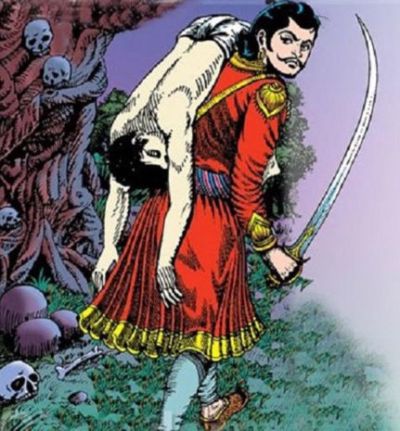“And so we must tell the king that she does not have the requisite qualities.”
The ministers decided this, and told the king that the girl was unfit to be his queen.
In turn, Yaśodhana politely declined Unmada’s offer to told him that he would not be able to marry his daughter.

ततस् तदाज्ञया तां स कन्याम् उन्मादिनीं पिता ।
वणिग् बलधराख्याय तत् सेनापतये ददौ ॥ १२,२४.१८ ॥
अथ सा तद्गृहे तस्थौ भर्त्रा तेन समं सुखम् ।
कुलक्षणेत्य् अहं रज्ञा त्यक्तेत्य् आत्तविमानना ॥ १२,२४.१९ ॥
याति काले च जात्व् अत्र हत्वा हेमन्तहस्तिनम् ।
फुल्लकुन्दलतादन्तं मथिताम्बुजिनीवनम् ॥ १२,२४.२० ॥
आजगाम लसत्पुष्पमञ्जरीकेसरावलिः ।
चूताङ्कुरनखः क्रीदन् कानने मधुकेसरी ॥ १२,२४.२१ ॥
तत् कालं चात्र नगरे तं वसन्तमहोत्सवम् ।
स राजा निर्ययौ द्रष्टुं गजारूढो यशोधनः ॥ १२,२४.२२ ॥
तद्रूपालोकसंभाव्यविप्लवाः कुलयोषितः ।
अपसारयितुं दत्तं तदा चोद्घोषडिण्डिमम् ॥ १२,२४.२३ ॥
“But, there is an alternative”, said Yaśodhana, and he proposed the name of his commander in chief of his armies – Baladhara, as a prospective suitor.
Unmada agreed and so the marriage was conducted on the same day, and Unmādinī went to live in her new house. Even though she was happy in her new life, Unmādinī always maintained a grudge against the king, for having rejected her.
As time passed, the lion of spring arrived in the city, slaying the elephant of winter, one that had, with flowering jasmine creepers for tusks, had ravaged the lotuses of the summer.
And the lion of spring was in full bloom in the forest, with clusters of bright flowers as the mane, and mango buds as it’s claws.
One day in spring, King Yaśodhana mounted his royal elephant, and set out to witness the festivities that had started in his city.
A couple of drummers walked ahead, as the king’s entourage made it’s way through the streets…they announced that all married women should stay indoors, lest they get attracted by the king’s handsomeness.
सा श्रुत्वोन्मादिनी तस्मै राज्ञे स्वगृहहर्म्यतः ।
आत्मानं दर्शयामास परित्यागावमानतः ॥ १२,२४.२४ ॥
स च तां चक्षुभे दृष्ट्वा राजा ज्वालाम् इवोद्गताम् ।
संधुक्षितस्य कामाग्नेर् मधुना मलयानिलैः ॥ १२,२४.२५ ॥
निर्वर्णयंश् च तद्रूपं जैत्रम् अस्त्रं मनोभुवः ।
गाढं प्रविष्टं हृदये क्षणान् मोहम् उपाययौ ॥ १२,२४.२६ ॥
भृत्यैर् आश्वासितश् चात्र राजधानीं प्रविश्य सः ।
पृष्टेभ्यो बुबुधे तेभ्यस् तां प्रागुपनतोज्झिताम् ॥ १२,२४.२७ ॥
ततो निर्वास्य देशात् तांस् तत्कुलक्षणवादिनः ।
विप्रान् अनुदिनं दध्यौ ताम् एवोत्कः स भूपतिः ॥ १२,२४.२८ ॥
When Unmādinī heard the drums and the accompanying announcement she remembered her humiliation, and so walked up to the terrace of her house and showed herself to the king, who was passing her street that very minute.
King Yaśodhana saw her, shining like a flame rising from the fire of love, when fanned by the winds from the sandalwood forests of the Malaya mountains…and he nearly swooned.
Seeing her immense beauty, the arrows of Kāmadeva struck his heart, and he fell unconscious.
His attendants immediately brought him back to the palace, and when the king finally woke ups he found out, by questioning them, that the beauty he had seen was the same girl that had been rejected by him earlier.
Infuriated, he banished his ministers from the city, and spent many days and nights thinking about her, saying to himself…
to be continued…
